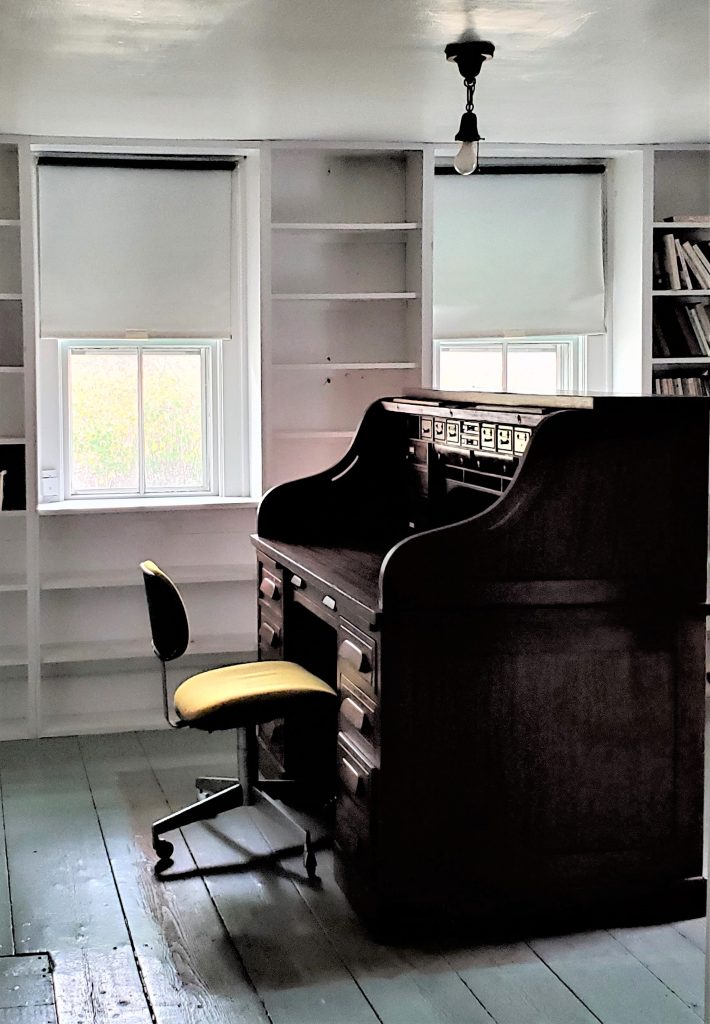
Spring and the anticipation of new poetry are returning to Eagle Pond Farm, where poets Donald Hall and Jane Kenyon shared a writing life.
Looking out on Eagle Pond and pressed against Ragged Mountain, this farm where Andover and Wilmot meet was in Don’s family from the time of the Civil War until he died in 2018. Don loved the farm.
Growing up in Connecticut, he came every summer to stay with his grandparents and help with farm work. It was here, too, during those summers, that he first began writing poetry.
After Don and Jane married in 1972, they came in 1975 to try a year of living and writing at the farm. Discarding little from previous generations, they filled the house still further with books and art, added a ping pong table–and stayed. Jane died here at 47 in 1995 and Don, months short of 90, just six years ago.

Jane said that it was coming to the farm that made her a poet because it gave her a place to write, a place to take root, and a subject to write about. As for Don, anyone who has read his work knows the importance of the farm to him.
He and Jane were both New Hampshire poet laureates and Don was also named US poet laureate. Their prizes and awards are many, and the US State Department sent them twice to India, and also to China and Japan, to represent American poetry. They are celebrated nationally and globally but also, and as famously, locally and statewide.
Both very much belonged to Andover, Danbury, and Wilmot. They cherished being part of these communities, and, despite their eminence, they were always “Don and Jane.” Where they lived and wrote is a place of sentiment and pilgrimage for people who know their work – and more so because what they wrote was informed by the house, the surround of farm, and the sense of place they found here.
People from all over come to see this and take inspiration from it. And poets come, also, to write from their own experience of the farm, the place that frames it, and the rooms where Jane and Don wrote and looked out the windows.
Eagle Pond Farm isn’t, however, about only Don and Jane. It is an enduring example of the hill farms that, until recent years, were typical of life in rural New Hampshire since the 1700s. But more and more these corners of the countryside are disappearing or have already, making this one an important testament to the history and landscape that have shaped the state’s identity and heritage.
Don’s book, String Too Short to be Saved, recalls the life his grandparents (and, nearby, their extended family and neighbors) lived here. His classic picture book, Ox-Cart Man, which is truly global in its uncounted translations around the world, depicts the habits and seasons of such farms as the one at Eagle Pond in the 1800s.
Because of the celebrity of Don’s and Jane’s poetry and other writing, the farm is recognized as a national historic landmark and is in the process of being listed on the National Register of Historic Places.
But five years ago exactly, the first week of May, the future of the farm was uncertain. It was then a year since Don’s death, and the farm was being sold. Two auctions and an estate sale were scheduled, too. It seemed that what had made this more than just any old New Hampshire farm was ending.
That was when a brigade of friends, neighbors, and colleagues came together to create a nonprofit, At Eagle Pond, Inc., to buy the farm and take on the care of it, as well as to honor Don’s and Jane’s work, open the house to visitors, offer public programs, and provide residencies to writers to keep the farm a place where poetry happens.
In committing to preserving the farm and what it is about, the organization has accepted stewardship of not only a literary landmark but also an evocation of a way of life and a time in history. It invites reflection on the place of poetry and long memory in all of our lives, and it sustains a connection with the natural world that is tonic.
Visitors remarking on why preservation of the farm matters echo a New York poet who said, after coming to the farm, “To be close to the spirit and lingering presence of these two poets whose work has come to mean so much to me, to see how they lived, to witness the place they knew, and to be made more aware of what I can bring to my own work: that will stay with me as much as their poetry will.”
Neighbors, too, experience the same connection, even just driving by. More than a few admit to giving a nod every time they pass.
For more about the farm and the nonprofit’s plans and activities, visit www.ateaglepond.org, where there’s also a link to newsletters.